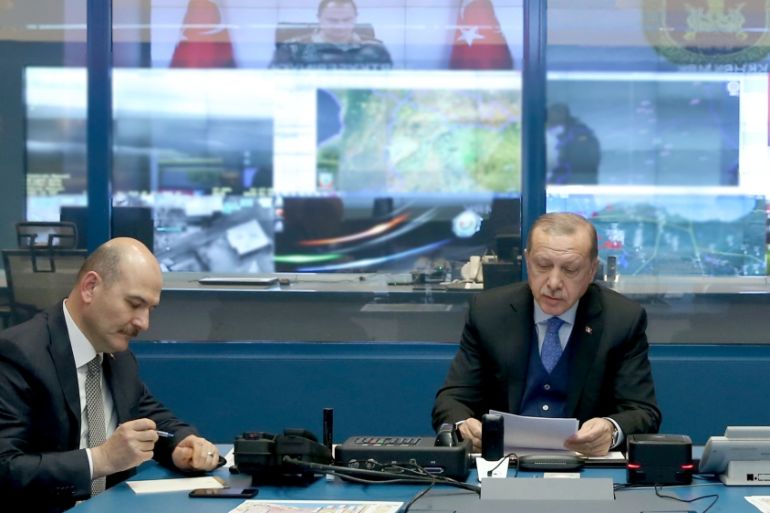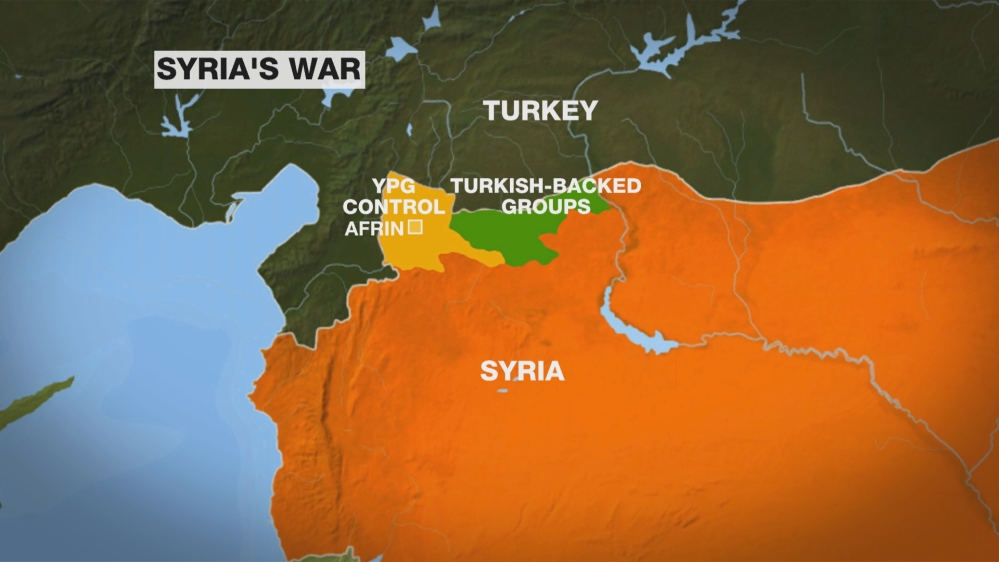What is Russia’s end game in Afrin?
Growing US-Kurdish ties and a possible change in Turkey’s position on Assad may be behind Moscow’s tacit support.

Turkey launched its air and ground operation against Kurdish fighters in the Syrian enclave of Afrin on Saturday, with Moscow turning a blind eye on the military offensive.
Russian forces were withdrawn from the area just before the operation began and Turkish jets were allowed to use the Afrin airspace, controlled by the Syrian government and Russia.
Keep reading
list of 4 itemsWorld Food Programme to end general assistance in northwest Syria
Erdogan open to meeting al-Assad but not to withdrawal from Syria
Middle East Roundup: What’s going on with Saudi Arabia and China?
The development comes at a time when relations between Turkey and Russia have been gradually getting closer in the context of the Syria conflict, whereas tensions have been rising between Ankara and Washington, which backs the Kurdish fighters in northern Syria.
Moscow has traditionally been a staunch supporter of the Kurdish Democratic Union Party (PYD) and its armed People’s Protection Units (YPG) that have come to control large swaths of northern Syria, including Afrin.
The YPG was at the forefront of the fight against the Islamic State of Iraq and the Levant (ISIL, also known as ISIS) group, which had captured large parts of Syria and neighbouring Iraq in 2014.
The PYD has a political representation office in the Russian capital since 2016 and received a high level of Russian political support in the international arena in the past.
Russian observers in and around Afrin had been cooperating with the YPG forces to prevent conflicts among different armed groups until the Turkish incursion started.

Russians have been in contact with PYD officials over the Syria issue, including ministerial level discussions on post-crisis Syria.
As recently as December, a Russian general and YPG officials met in the government-held eastern city of Deir Az Zor in talks that, according to Moscow, “evaluated the steps to be taken” after the removal of ISIL from the region.
However, other reports suggested that military cooperation in certain regions was also discussed in those talks, which angered Ankara.
Turkey considers the PYD and YPG “terrorist groups” with ties to the banned Kurdistan Workers’ Party (PKK), which has waged a decades-long armed rebellion in Turkey, first for independence, then more autonomy and finally to achieve, what they call, a “fully democratic Turkey”.
More than 40,000 people in Turkey have been killed since the 1980s when the PKK launched its rebellion in the southeastern part of the country.
The PKK is blacklisted as a “terrorist” organisation by the US and the EU, but not by Russia. But none of the three considers PYD and YPG as “terrorist” groups.
‘Russia has betrayed us’
The PYD is furious at Russia for allowing the Afrin offensive. In a statement published on its website on Saturday, the PYD openly blamed Russia for the operation.
“We know that, without the permission of global forces and mainly Russia, whose troops are located in Afrin, Turkey cannot attack civilians using Afrin airspace,” the statement said.
“Therefore, we hold Russia as responsible as Turkey and stress that Russia is the crime partner of Turkey in massacring the civilians in the region.”
The Syrian Democratic Forces (SDF), a US-backed umbrella group of fighters led by the YPG that was formed to fight ISIL, echoed the PYD’s reaction by calling Russia’s act “immoral” and “a betrayal”.
“We agreed with Russia to observe Afrin on the peaceful principles, but it now allows Turkish warplanes to attack Afrin. It means Russia has betrayed us,” SDF spokesman Keno Gabriel said on Monday.
Russian Foreign Minister Sergey Lavrov has blamed the US of trying to take control of the whole of Syrian-Turkish and Iraqi-Turkish borders by creating alternative authorities in Syria, pointing fingers at the SDF.
“Washington carries out open, and discreet delivery of arms to Syria for transfer to those groups that cooperate with them, especially to the SDF,” he said on Monday.
On the same day, Turkish President Recep Tayyip Erdogan said that Turkey had an agreement with Russia regarding its military operation that would be extended to Manbij, another Kurdish-held town.
According to Mensur Akgun, a Turkish international relations professor, Russia’s move was understandable in light of Turkey’s firm stance on the PYD and YPG, and Moscow’s annoyance with the group’s close cooperation with the US.
“They are getting great support from the US. Washington is using the group, particularly in the east of the Euphrates [river], as a balancing force against the other powers there. They are using the group in order to increase the US presence and activities in this region,” he told Al Jazeera.
“I think this has become obvious with the announcement of the new border force planned to be set up there. Moscow, in my opinion, showed green light to Turkey’s operation to decrease the US influence in the region.”
Sergei Markov, a political analyst and a former MP from President Vladimir Putin’s United Russia Party, believes it was Moscow’s way of increasing tensions between Washington and Ankara.
“Russia does not publicly support such a military operation, but it opened the gate for this operation because it basically starts a proxy war between Turkey and the US [through YPG],” he told Al Jazeera.
He added that if the US, Kurds and Turkey fight each other, that would be regarded as a very positive trend by the Syrian government, which is backed by Russia and opposes all of those sides.
Reports on new force anger Ankara
The announcement by the Turkish government over the launch of the Afrin operation was prompted by reports, quoting US military officials, which said that Washington planned to create a new 30,000-strong border army predominantly made up of YPG members.
US Secretary of State Rex Tillerson’s denial that his country had any such plans was not enough to convince Ankara to back down on the military operation.
Erdogan had said that the operation in Afrin would be followed by a push into the northern town of Manbij, which US-backed Kurdish forces had captured from ISIL in 2016.
Ahmet Berat Conkar, a ruling party MP and head of the Turkish delegation to the NATO parliamentary assembly, said that Ankara’s cooperation with Russia in the region was far more functional than Ankara’s NATO ally.
“Russia understands the sensitivities of Turkey, whereas Washington supports and delivers weapons to the terrorist group PYD/YPG,” he told Al Jazeera.
“Russia respects Turkey’s request not to have this group at the negotiation table in the Astana process.”
Russia and Iran, which support Syrian President Bashar al-Assad’s regime, and Turkey, which backs the moderate opposition, have been in close cooperation through the so-called Astana talks that aim at finding a solution to the Syrian conflict.
Various so-called “de-escalation zones” were agreed among the three guarantor powers in Syria as a result of multiple rounds of talks in the Kazakh capital. The PYD is not a party to the talks mainly due to opposition from Turkey.
![The SDF and YPG played a prominent role in the defeat of ISIL [File: Goran Tomasevic/Reuters]](/wp-content/uploads/2018/01/be022c3c983c47fe8c305fe5ebac4062_18.jpeg)
Washington decided to arm SDF fighters in May 2017, despite Turkey’s objections and a direct appeal from Erdogan at a White House meeting later in the same month. They also have been training thousands of SDF fighters in northeastern Syria.
The US arms shipments began even before the launch of months-long offensive to remove ISIL from the Syrian city of Raqqa. The SDF and YPG played a prominent role in the eventual defeat of the group later in 2017.
Tensions between the US and Turkey remain high, despite Trump saying last November that Washington would no longer supply weapons to the YPG.
Professor Akgun told Al Jazeera that Moscow wanted to get Assad included in a resolution to the Syrian conflict, at least in the transitional period after the war and allowing the Afrin operation might influence Turkey to change its stance on the issue.
“Letting Turkey carry out the Afrin operation is a way to convince Ankara to be perhaps more flexible in certain issues regarding Syria in the course of Astana talks, such as Assad’s situation in a transitional government in Syria,” he said.
Fuad Shahbazov, an independent expert on Russia and Middle East affairs, said that Turkish side seemed to have made certain promises to Russia over Assad in order to get the green light for the offensive.
“I don’t think that Turkey will radically change its strict position over Assad remaining not in power,” he told Al Jazeera.
“The Turkish side could have made promises such as refraining from sharp criticism of the Assad regime or unofficially launching dialogue with the Syrian president.”
Follow Umut Uras on Twitter @Um_Uras and Tamila Varshalomidze @tamila87v